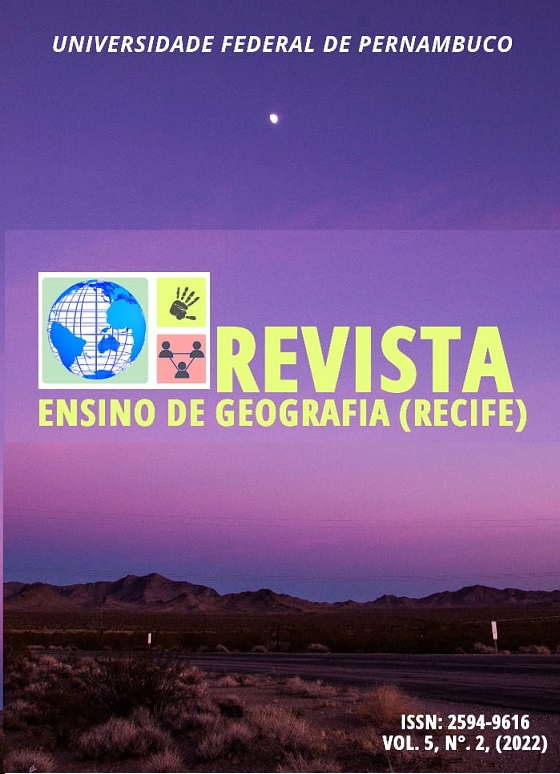Educating for human rights: perspectives and approaches from education 5.0
DOI:
https://doi.org/10.51359/2594-9616.2022.253582Keywords:
Education 5.0, Human rights, Teaching geographyAbstract
Education 5.0 is characterized as a new educational proposal willing to unite the various applications that technologies offer to education, training for the labor market allied to the well-being of individuals and the construction of an individual, collective, and integrating socio-environmental consciousness. Thinking about an educational breakthrough is also thinking about a process that encompasses the universal right to quality education, based on citizenship and student autonomy in the face of technological advances and their reflections in time and space. This paper builds relationships between the guidelines present in the BNCC, teacher training and its consequences, seeing the complexity of aneducational system founded under the aegis of the capitalist system. We face the challenge of developing reflections on rethinking the teaching of geography, such that it is able to connect with the multiple experiences of school subjects -many of these neglected for centuries, consolidating forms of education that are more accessible and less reproductive of inequalities. In this way, the reflection about the paradigms that society faces in times of a liquid modernity, in which power, law and truth dictate the course of the education idealized in official documents, reveal the real face of how educating for human rights is a reality that needs planning as much as engagement of all instances that are related to its realization
References
BACICH, Lilian e MORAN, José. Metodologias ativas para uma aprendizagem mais profunda. Metodologias ativas para uma educação inovadora: uma abordagem teórico-prática. Porto Alegre: Penso, p. 02-25, 2018.
BAUMAN, Zygmunt. Modernidade Líquida. Rio de janeiro: Jorge Zahar, 2001.
BRASIL. Ministério da Educação. Base Nacional Comum Curricular. Brasília, 2018.
BRASIL. Constituição (1988). Constituição da República Federativa do Brasil. Brasília, DF: Senado Federal: Centro Gráfico, 1988
FOUCAULT, Michel. Microfísica do poder: organização e tradução de Roberto Machado. Rio de Janeiro: Edições Graal, v. 4, 1979.
IBGE, Diretoria de Pesquisas, Coordenação de Trabalho e Rendimento, Pesquisa Nacional por Amostra de Domicílios Continua, 2018.
KENSKI, Vani Moreira. Educação e internet no Brasil. Cad Adenauer, v. 16, n. 3, p. 133-150, 2015.
KONZEN, Marita Beatriz. Educar para os direitos humanos. In: LIMA, Maria Socorro Lucena et al. Didática e prática de ensino na relação com a escola. Editora UECE, 2015.
MORAN, José Manuel. Como utilizar a Internet na educação, Ciência da informação, v. 26, n. 2, 1997.
MORIN, Edgar. Introdução ao pensamento complexo. Coleção Epistemologia e Sociedade. Sociedade Astória, Lisboa, 2a ed., 1990.
RIBEIRO, Djamila. Lugar de fala. Pólen Produção Editorial LTDA. 2019.
SANTOS, Amarildo Enes dos; OLIVEIRA, Carlos Antonio de; CARVALHO, Elma Nunes de. Educação 5.0: uma nova abordagem de ensino-aprendizagem no contexto educacional. 2019.
SANTOS, Milton. Por uma outra globalização: do pensamento único a consciência universal. 19a Ed; Rio de Janeiro: Record, 2010.
VALLE, Luis Felipe Catusso. Interpretações sobre o espaço geográfico a partir do mundo virtual. Anais do 14o Encontro Nacional de Prática de Ensino de Geografia: políticas, linguagens e trajetórias, p. 2513-2524, 2019.
VALLERIUS, Daniel Mallmann. O delinear de uma identidade profissional cidadã dos futuros professores de geografia no estágio supervisionado: alguns olhares. ACTA Geográfica, Boa Vista, Edição Especial 2017.
Downloads
Published
How to Cite
Issue
Section
License
Copyright (c) 2022 Matheus Rivail Pereira, Dhayanna Chrystian Silva de França, Bruno Vieira de Andrade, Tâmara Carla Gonçalves Bezerra

This work is licensed under a Creative Commons Attribution 4.0 International License.
Authors who publish with this journal agree to the following terms:- Authors retain copyright and grant the REVISTA ENSINO DE GEOGRAFIA (RECIFE) right of first publication with the work simultaneously licensed under a Creative Commons Attribution NonCommercial International 4.0 (CC BY-NC) that allows others to share the work with an acknowledgement of the work's authorship and initial publication in this journal.
- Authors are able to enter into separate, additional contractual arrangements for the non-exclusive distribution of the journal's published version of the work (e.g., post it to an institutional repository or publish it in a book), with an acknowledgement of its initial publication in this journal.
- Authors are permitted and encouraged to post their work online (e.g., in institutional repositories or on their website) prior to and during the submission process, as it can lead to productive exchanges, as well as earlier and greater citation of published work.



